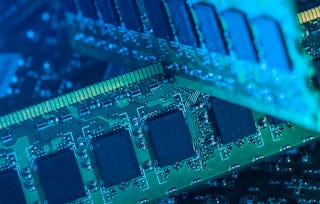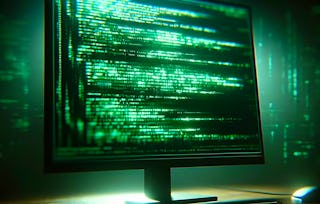Embark on a comprehensive journey into Embedded Systems with this course. Module 1, "Introduction to Embedded Systems," lays the foundation by exploring principles, architectures, and essential devices. In Module 2, "Programming Fundamentals in C," participants master C programming essentials, including operators, storage classes, and flow control structures. Transitioning to Module 3, "Advanced Concepts in C for Embedded Systems," participants delve into functions, arrays, pointers, and string manipulation techniques. By the course's conclusion, participants emerge equipped with the knowledge and skills necessary for confident navigation and programming in C for embedded systems development.

Embedded Systems using C

Embedded Systems using C
This course is part of Embedded Software Development with C Specialization

Instructor: EDUCBA
11,262 already enrolled
Included with
123 reviews
Recommended experience
What you'll learn
Understand Embedded Systems principles, architectures, and essential devices
Master C programming essentials include operators, storage classes, and flow control structures
Explore advanced C concepts crucial for embedded systems, such as functions, arrays, pointers, and string manipulation techniques
Skills you'll gain
Details to know

Add to your LinkedIn profile
16 assignments
See how employees at top companies are mastering in-demand skills

Build your subject-matter expertise
- Learn new concepts from industry experts
- Gain a foundational understanding of a subject or tool
- Develop job-relevant skills with hands-on projects
- Earn a shareable career certificate

There are 3 modules in this course
This module delves into the fundamentals of embedded systems, providing a comprehensive understanding of their principles and components. You will explore the architecture of embedded systems, distinguishing between microcontroller units (MCUs) and microprocessor units (MPUs) to select the suitable platform. You will learn to identify essential devices employed in embedded systems and establish conducive environments for development and testing. By the module's conclusion, you will possess the knowledge necessary to navigate and analyze embedded systems effectively, setting the stage for further exploration into advanced topics in the field.
What's included
7 videos4 readings5 assignments1 discussion prompt
This module offers a comprehensive exploration of C programming, focusing on its application in embedded systems development. You will delve into various types of operators in C and grasp their significance in efficient programming for embedded systems. Through practical examples, you will gain proficiency in different storage classes and their usage in embedded systems development. Additionally, you will understand flow control structures in C, including conditionals, loops, and control statements, enabling them to program effectively for embedded systems applications. By the module's conclusion, you will be well-equipped to navigate and program in C for embedded systems development confidently.
What's included
30 videos5 assignments1 discussion prompt
This module provides a comprehensive exploration of essential concepts in C programming for embedded systems development. You will delve into functions, understanding their types and mastering their usage through practical programming examples. You will then explore arrays, learning how to efficiently store and manipulate data. Next, you will grasp the concept of pointers and their significance in C programming, including pointer-to-pointer scenarios. Additionally, you will identify string manipulation techniques using arrays and pointers, enhancing their proficiency in embedded systems development. Finally, you will explore the step-by-step process of creating, programming, building, and deploying a simple embedded systems project.
What's included
21 videos6 assignments1 discussion prompt
Earn a career certificate
Add this credential to your LinkedIn profile, resume, or CV. Share it on social media and in your performance review.
Explore more from Software Development
Why people choose Coursera for their career

Felipe M.

Jennifer J.

Larry W.

Chaitanya A.
Learner reviews
- 5 stars
58.40%
- 4 stars
15.20%
- 3 stars
8.80%
- 2 stars
8.80%
- 1 star
8.80%
Showing 3 of 123
Reviewed on Oct 22, 2025
Well-explained concepts and real examples made embedded C easy to grasp.
Reviewed on May 18, 2025
I recently finished the Embedded C course, and I thought it was really thorough and organized.
Reviewed on May 26, 2025
Fantastic Course, which I refer to anyone who is starting to learn Embedded C

Open new doors with Coursera Plus
Unlimited access to 10,000+ world-class courses, hands-on projects, and job-ready certificate programs - all included in your subscription
Advance your career with an online degree
Earn a degree from world-class universities - 100% online
Join over 3,400 global companies that choose Coursera for Business
Upskill your employees to excel in the digital economy
Frequently asked questions
To access the course materials, assignments and to earn a Certificate, you will need to purchase the Certificate experience when you enroll in a course. You can try a Free Trial instead, or apply for Financial Aid. The course may offer 'Full Course, No Certificate' instead. This option lets you see all course materials, submit required assessments, and get a final grade. This also means that you will not be able to purchase a Certificate experience.
When you enroll in the course, you get access to all of the courses in the Specialization, and you earn a certificate when you complete the work. Your electronic Certificate will be added to your Accomplishments page - from there, you can print your Certificate or add it to your LinkedIn profile.
Yes. In select learning programs, you can apply for financial aid or a scholarship if you can’t afford the enrollment fee. If fin aid or scholarship is available for your learning program selection, you’ll find a link to apply on the description page.
More questions
Financial aid available,




